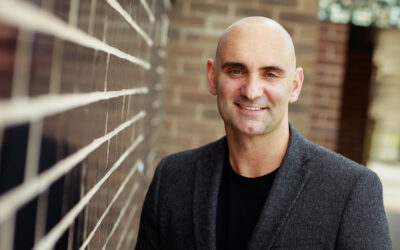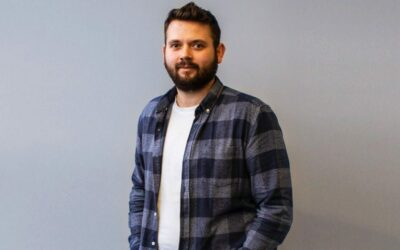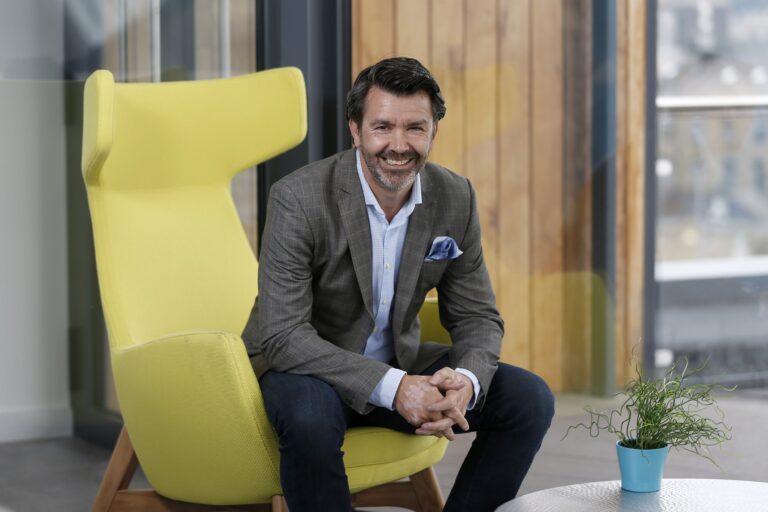Vapour is a Huddersfield-based cloud tech leader led by CEO Tim Mercer, who co-founded the company in 2013.
The organisation provides a range of end-to-end cloud services, including customer service solutions, process automation, cloud security, and more. In the past they’ve provided platforms and transformations for clients including Betfred and JCT600.
CEO Mercer has experience working at companies including Telewest and Abzorb, and started out in the British Army before moving into the digital world.
We found out the kind of lessons his varied career has taught him…
Which single daily habit or practice could you not do without?
Any form of exercise – whether it’s a morning run, an hour in the gym, a boxing session or a spot of yoga, I find physical activity keeps my mind straight too.
What’s been your luckiest break?
Probably getting the job at Virgin Media (which was then Telewest), back in 1999 when I moved back up North from London.
I had sales experience but in a different sector, and I needed a job. I think to a degree you can create your own luck, so I researched where I wanted to go and, despite having no background in tech, I got the role. This position kickstarted the rest of my career.
Securing finance for Vapour when we first started out also felt like luck. I knew nothing about raising money, and arguably felt like I was winging it at the time, because I didn’t know any different. But my vision was clear and disruptive, and thankfully investors recognised that.
What’s your best failure?
I lost out on a massive deal at Virgin which taught me the importance of managing upwards, not only the people who report to you. We took too long on the negotiations – there were six months of discussion, internally, before we could reach our own agreement and when we finally went back to the customer, they’d gone elsewhere. They didn’t actually want to – they’d have chosen us – but we didn’t act quickly enough.
What is the best investment you’ve ever made, either financial or time?
Investment in myself to try and be better.
I’m a bit of a workaholic and thrive on being busy, but as I’ve matured in my role as CEO, I dedicate the time out to listen to myself a little more, work on business strategy and also actually switch off. I think we’re programmed – as both business leaders and employees, to a degree – to think that time away from supporting customers or colleagues is indulgent, or not worth it. This couldn’t be further from the truth, but it takes discipline to actually find that time.
Which book would you recommend others to read and why?
‘Shoe Dog’. It doesn’t matter whether you’re a fan of Nike or not. Phil Knight didn’t go out to build a billion-dollar company. His vision, to create amazing running shoes, was his passion, and became his business, a hugely successful one. It’s a fascinating read packed full of lessons, because even when they were thriving, the challenges came thick and fast. It’s an easy read, and Phil comes across really well.
What one piece of advice would you give your 21-year-old self?
To get rid of that chip on my shoulder. I was a bit of an arse – I had issues I needed to deal with and should have done at the time. If I had, perhaps I wouldn’t have been as scared about setting up by myself, and I’d have taken more risks earlier in my career.
I think it’s daunting to make tough decisions and big leaps, maybe more so when you’re not as well educated or don’t have the support mechanisms around you that you’d like. But you can still do it.
Who or what has had the single biggest influence on your working life?
On a personal level, being in the Forces – especially because I was young. It drastically shaped how I saw the world, not least because expectations regarding how you should behave, interact with a team, and stand up for one another, are clear and non-negotiable.
In professional terms, joining Telewest. In the early days, believe it or not, it felt like an ambitious start-up. Creating processes and teams as we went along, it was an agile business, decades before the term became trendy. There was so much energy, enthusiasm, and dynamism, with great training. We built fantastic, long-lasting relationships, which is perhaps why so many people want to come and work with Vapour now – it says a lot.
Tell us something about you that would surprise people.
I really like the ballet – long before my daughter started dancing too. I went to see it with a former girlfriend and was captivated. The choreography, strength, elegance, music and determination is amazing.
How will the COVID crisis change work for the better?
I think we have become more open to understanding people’s needs, especially regarding mental health and wellbeing. I think sadly it was secondary for many businesses previously – with some organisations merely paying lip service to it. Now, ignorance or carelessness on the subject will not be tolerated, which is important.
Employees generally have more of a voice too – they’re no longer comfortable with being dictated to. This should make organisations better, more authentic employers, who live and die by their values, rather than simply posting them on their website because they sound good. The challenge is to establish an approach that suits all, as people are individual.
So while people are quite right to state what they’d like from the workplace, everyone should be more respectful and understanding of each other. There isn’t a linear top-down or bottom-up answer.
What does success look like to you?
Success used to be relatively binary to me – money and the material things that it can buy.
However, I grew to learn the success actually affords you freedom and choice, especially surrounding time, growth and enjoyment.











